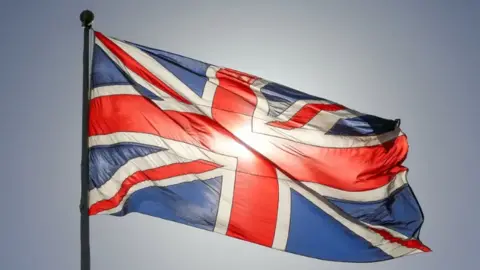### Union Flag Theft on Queen’s Birthday Investigated as ‘Sectarian Hate Crime’
On July 17, 2025, significant unrest erupted following the theft of a union flag that was being displayed at a civil service building in Lisahally, a notable site in Londonderry, Northern Ireland. This act coincided with the celebration of Queen Camilla’s 78th birthday. According to reports from BBC News NI, the flag was reportedly replaced with an Irish tricolour, which heightened tensions in an area largely characterized by its mix of cultural identities.
The Department for Communities, which oversees civil service buildings, confirmed their acknowledgment of the “unauthorized” removal of the union flag. As a result, the Police Service of Northern Ireland (PSNI) has taken this incident seriously, categorizing it as a “sectarian hate crime.” Given the historical context and significance of the union flag in Northern Irish society, this incident has stirred a divisive narrative surrounding community relations.
### Responses from Political Figures
The political fallout from this event has been striking, with various leaders expressing outrage. The Democratic Unionist Party (DUP), represented by Gory Middleton, labeled the act of removing the union flag and erecting the Irish tricolour as “an idiotic act.” Middleton condemned the action as “silly attention-seeking behavior” that is both disrespectful and unacceptable, urging legal accountability for those responsible.
Darren Guy, a councillor from the Ulster Unionist Party, echoed Middleton’s sentiments, stating that such acts are driven by “hate and sectarianism.” He highlighted ongoing acts of vandalism and theft across the district, including the destruction of soldier statues and the theft of a historical U.S. flag, framing these acts as part of a growing trend of sectarian violence.
Guy was critical of Sinn Féin and the Social Democratic and Labour Party (SDLP), accusing them of failing to address these issues adequately. He suggested that the lack of action against such incidents perpetuates a cycle of unrest, further complicating the possibility of a united Ireland. Sinn Féin’s representatives responded by asserting their commitment to call out all incidents of hate crime and indicate that the criticism levelled against them was inconsistent and devoid of merit.
### The Broader Community Impact
Beyond political disagreements, SDLP MLA Mark H. Durkan intervened to stress the detrimental impact of sectarian incidents on community relations. He urged for a spirit of tolerance, emphasizing that attacks on symbols of culture, regardless of their origins, ultimately harm citizens across the board. Durkan called upon individuals engaged in such activities to reconsider their actions, stressing that they serve only to hurt their own community rather than engage in meaningful dialogue or solutions.
The aftermath of this incident has implications far beyond the immediate act of theft. The union flag, often seen as a symbol of identity for many in Northern Ireland, evokes deep-rooted sentiments tied to the region’s complex history. Under legal guidelines, specific days necessitate the flying of the union flag from government buildings in Northern Ireland. The persistent tensions surrounding such symbols highlight the ongoing challenges in navigating communal harmony and respect for differing cultural identities.
### Conclusion
As investigations continue into this theft, the incident will likely further inflame tensions within a region still grappling with its legacy of sectarian conflict. The communal and political responses reveal the fragile nature of relations in an area marked by historical grievances, urging all parties involved to tread carefully as they navigate this sensitive landscape. Increasingly, politicians and community leaders are called upon to make constructive contributions that mitigate division and foster an environment where multiple identities can coexist peacefully.











